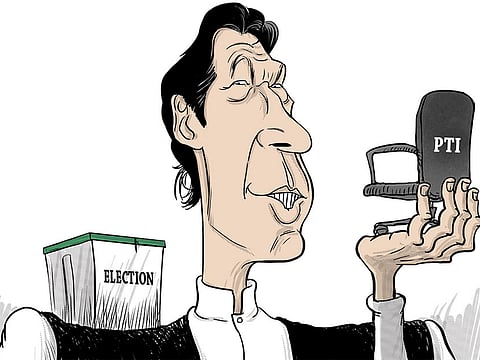It is advantage Imran as Pakistan goes to polls
Pakistan Tehreek-e-Insaf is likely to head a coalition government as it is unlikely to win an absolute majority

Will it be Imran Khan all the way in today’s general election? Probably yes, if the recent political developments are any indication. But he is unlikely to garner an absolute majority. The other two major players, Shahbaz Sharif and Bilawal Bhutto Zardari, are still in the game. We believe Pakistan is heading towards another coalition government with no party securing a clear majority form the national government.
Emotions have overtaken rationale in the run-up to the elections. The contest between the three major political parties has heated up with Imran Khan’s Pakistan Tehreek-e-Insaf (PTI) enjoying a definite edge. The three recent terror attacks during election rallies have cast a pall of gloom over the campaign as leaders of most political parties are on the hit-list of terrorists.
There are more than 105.9 million voters in Pakistan, and that include 19.7 million young new voters, who mostly support Imran. Voters are likely to favour Imran because they have tried the leaders of other two mainstream parties — Pakistan Peoples Party (PPP) and Pakistan Muslim League-Nawaz (PML-N). Imran’s mantra of the fight against corruption has resonated well with the voters.
Today’s election differs in many ways. Polls are generally very competitive, full of activities, passion and energy, but the present campaign has been lacklustre. More often it appeared to be a one-horse race. With former prime minister Nawaz Sharif behind bars and PPP’s Zardari family fighting cases in courts, Imran has emerged the front-runner. The Supreme Court has cleared Imran in a case over his assets, burnishing his credibility. His political philosophy complements the state policy, and that makes him a good candidate for the premiership.
A top state agency predicted 116 seats for Imran’s PTI and only 57 seats for the PML, led by Nawaz Sharif. The leaked information gave only 40-odd seats for former President Zardari’s party. Analysts, however, are cautious in their estimates. They forecast around 90 seats for PTI and 70 seats for PML-N in the National Assembly of 272 seats. The PML-N strategists claim that their party will gain sympathy vote and will win more seat than the PTI. They are banking on the July 13 return of Nawaz Sharif and Maryam and their subsequent arrest to swing the sympathy vote. And they are sure of forming the provincial government of Punjab with a convincing majority.
The estimates and surveys differ, but the majority are of the view that PTI will form a coalition government with the help of 50-odd members of Baluchistan, FATA (formerly Federally Administered Area) and Karachi. These areas have faced military operations in the previous years so the poll winners will support Imran because of his tilt towards the state policy.
This election is a game changer as well because new political forces have eclipsed the old political groups and parties. PTI has taken the place of PPP in Punjab as the main rival of PML-N. Similarly, the urban Sindh party, MQM (representing Urdu speaking population) is in tatters, having split into three groups. Whoever wins urban Sindh’s 20 seats will support Imran.
MQM had reigned supreme in urban Sindh since 1988. Despite a 30-year winning streak, the party is merely a provincial pressure group fomenting violence in Karachi, the economic hub of the country. Military operations have dismantled the violent elements in MQM and its well-knit organisation. The party is trying to save its face by even excluding their founder Altaf Hussain.
Another new political force is Baluchistan Awami Party (BAP), which surprised many by getting its relatively unknown member Sadiq Sanjrani elected as Chairman of the Upper House of Senate. Analysts think that pro-establishment BAP will make its presence felt in Baluchistan, which is facing nationalist and separatist threats.
This election campaign has seen much less violence compared to 2008 and 2013, but there have been far too many disputes. The PML-N and the PPP are continually complaining that Imran Khan is getting a free ride. State meddling in politics weakens elections, which usually help evolve a consensus and resolve the disputes. But this election is likely to create more ripples in a divided society.
If a weak coalition led by Imran Khan comes to power, he can’t fulfil the promise of changing the society. The new prime minister will have to face a strong opposition, and confrontation can bring about a premature end to the government. The incarcerated Nawaz Sharif and his politically-suave daughter Maryam can be difficult to handle as jailed leaders get a lot of sympathies. In such a scenario, elections can be counterproductive as it will destabilise the system.
The Pakistan Army has deployed 371,000 soldiers at polling stations around the country. Some believe that the army is meddling in civilian affairs and may affect the result of elections, but we think that this is necessary to ensure safety and security of the candidates and the voters.
An overwhelming victory by either side will be followed by allegations of rigging as has been in the past. If Imran fails to get enough seats to form a government, a coalition between the PPP and PML-N is a distinct possibility, as in 2008. But we believe Pakistan is heading towards a coalition government led by Imran. The new government should have enough powers to tackle the issues facing Pakistan — water and energy crisis, the war against terrorism, relations with India, US and Afghanistan and above all worsening economic situation.
Suhail Warriach is a political analyst and television anchor based in Lahore.


